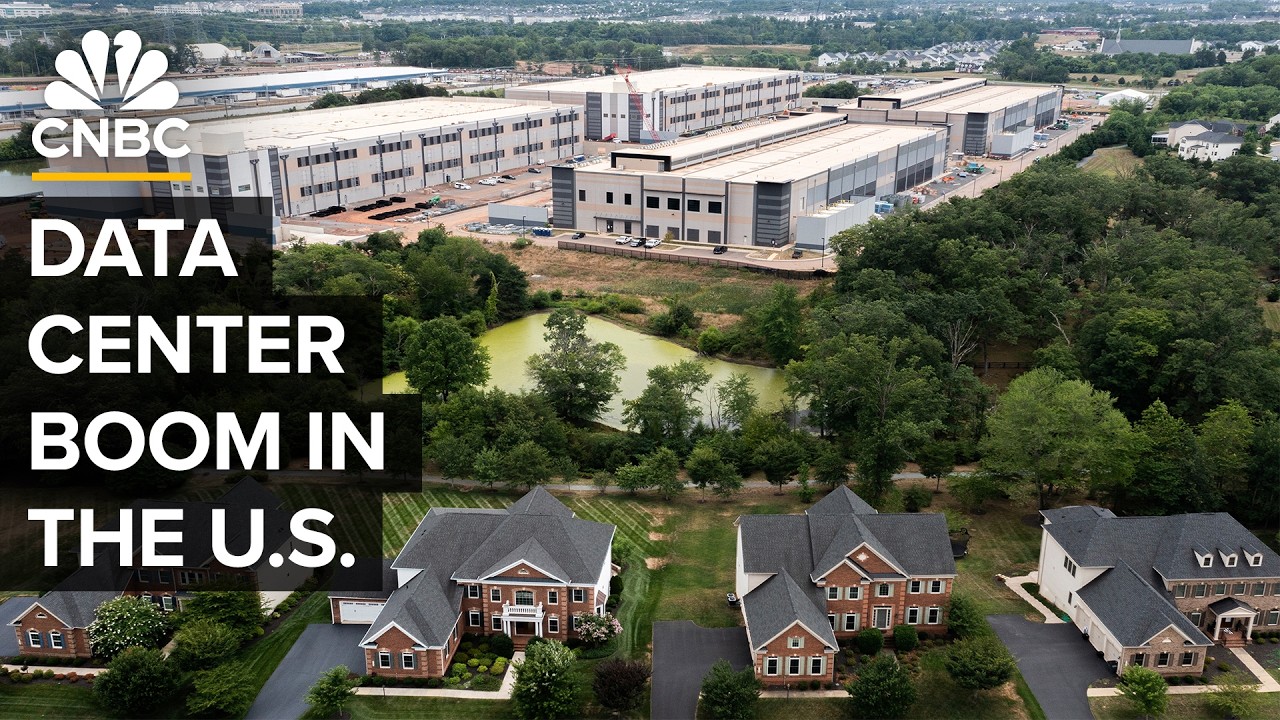The US is home to the majority of the world's data
centers. There are over 2800 in the United States, and the next
closest is the United Kingdom with less than 400. Now, data centers are becoming a real estate play for
investors. Simple economics. The demand exploded in the last couple of years. Data centers are the physical backbone of digital
infrastructure, housing, servers and the equipment to Run everything from AI and basic internet functions. But not everyone wants to live near these hubs of
electricity. 75 people signed on to speak, and most do not want data
centers built Near homes or schools. The campus of more than a dozen buildings would be
built near neighborhoods and three elementary Schools. The need for land to build the data centers on has
become a sore spot in states where hundreds of data Centers already exist, like Virginia. There has been a backlash against data centers, and
that's why I'm sitting in the seat that I am. People were frustrated. Residents felt like their voices were not being heard. They felt like some of the more contentious data
center projects should have never been approved and They want someone to listen to them. How data centers became billion dollar real estate
investments. The world's top tech companies are pouring billions
into building new data centers in the US. Amazon Web Services is investing an additional $35
billion to establish multiple data center campuses in New locations across Virginia by 2040. And top AI competitor Microsoft is reportedly planning
to build a $100 billion data center facility. What's driving that? Is AI, the big technology companies are telling us
that they're going to spend $1 trillion On their digital infrastructure over the next five
years. A lot of that's going to go into data centers. Vacancies decreased in the first quarter of 2024
compared to a year prior. Some experts say new infrastructure is still not
enough to keep up with the exponential demand for Computing power. I can safely say that in the next 3 to 4 years, we're
going to we're not going to solve this demand Problem. I think the demand for land is directly tied
to the demand for power, and the Value of the land goes up significantly.
If it's in close proximity to utility power that has
immediately available capacity. For example, Cyrus One data centers bought land in
Virginia for more than $89 million with plans to build. The seller had acquired the land for nearly $9 million
a couple years before. The data centers proximity to a power center and power
grid is more important than where the data center is Built in the country. So when you think about markets like Columbus, Ohio,
Reno, Nevada, those are examples of markets That have emerged over the last couple of years as an
alternative to places like Northern Virginia or Silicon Valley. It's interesting when we look at our global business
today, not just within real estate, but across the Entire firm, we see data centers as the most exciting
asset class. You know, when. You think about the the end users of the data center
space, the biggest users, you know, it's a Fortune 20 list, fortune 50 at best. All of them with a very strong balance sheet, all of
them with a significant demand For incremental data center space globally. So I my view is that we absolutely need more capital
to to grow This industry and to keep up with the demand that
we're seeing. That capital is coming through private equity
partnerships with data center providers. I am Jordan Sadler, the senior vice president of public
and private investor relations at Digital Realty. Our customers came to us and they said, you
know, how much capacity do you have Available in this market or that market or all
markets, depending on the the Customer? And this was an unusual request, and we Had multiple requests of this sort in order to execute
on all of that demand, essentially to Build all that capacity. We said, hey, let's tap some additional capital. The total value of commercial real estate property for
data centers rose more than 60% last year in places Like Loudoun County, Virginia, the data center capital
of the world local landowners are seeing the value of Their properties saw. We do see that land gets more value when it is On the appropriate power line for a data centers need. My experience in working with data centers is they do
value that and they do, you know, come, come to the Table aggressively in order to obtain that land. That means county tax revenues are considerably higher,
both the taxes for the property and the equipment Within the data centers.
In some ways, local landowners benefit. Had that revenue not come in from a data center or any
company or any industry in general, They would have had to probably raise taxes if they
wanted to improve their water system, or if they had Roads they wanted to improve. They might have to put that on the residents to pay
the taxes for it. But when you have a large user that has a significant
taxable Valuation or tax assessment, and that money does go
back to the community and there is a levy for The schools too. So it's kind of like giving the community a raise,
but. Utility rates can come in and impact them in other
negative ways. Dominion energy has proposed rate hikes in several
different states in 2024. They've dealt with unprecedented demand as of late,
thanks to data center business. Residents have growing concerns about the outward
appearance of data centers. There are varying degrees of pushback. And, you know, being an American, you know, you can
relate to certain states where they push Back quite a bit around all development in certain
locations where there might be more pushback around all Development. And then there are places that are, you
know, generally more pro-development. It's one of my concerns is where are we putting them? You know, are we putting them in areas that are
residential areas? Are we putting them in land that's industrial? Another consideration is, you know, how high can they
go? Um, there are some hyperscale data centers. We're looking at 110ft. Residents of Virginia's Prince William County have made
their concerns known. There's kind of a spectrum, and there's a benefit to
operating in the places Where it's tougher to build, because that typically
means there's Less competition or less supply. One planned data center in Virginia's Devlin Park
garnered enough pushback that a Twitter account and a GoFundMe account were created to raise awareness about
a potential project residents didn't want built. We have a lot of people on the board who are inclined
to really limit where we put data centers. We cannot put them in in everywhere, and we also have
a very strong, very vocal group Of data center. Opponents don't want us to build any
other data centers in the county, because they feel Like we have more than our fair share. Prince William County supervisors say they consider
each data center application that comes.
We cannot ban one industry from the county. We have to work with every applicant and look at every
application that we receive. I do have a great deal of concerns about where they're
sited. I have concerns about energy and I have concerns about
environment. And again, I am very concerned about Diversifying our
commercial tax base within the county. Some experts have also expressed concerns around the
obsolescence of these data centers not long after they Were built. If someone came in and said, you know, I'm going to
build a data center and I'm just going to lease it to Whoever needs a data center, that kind of raises a red
flag to me about sustainability. But Sadler feels like these buildings are not on a
quick path to become obsolete, thanks to the digital Transformations happening across industries. While you do see the leading edge customers, the
largest technology companies in the world Pushing the envelope on the on the infrastructure they
need to support the latest and Greatest Nvidia GPUs. Most customers by number are not the same as those
customers. They're not evolving their technology needs quite as
quickly. This massive strain on locality's power systems is
causing one company to consider renewable energy Capabilities. To meet this demand. Over time, as we catch up with supply and demand, I
think you will see some of that older space get Refurbished, repurposed, find alternative uses, maybe
EV charging facilities, fleet Charging. We've done a couple of conversions in the
northeast of of older telecom data centers Into vertical farming. So some really fascinating alternative uses. As for longevity of these buildings, experts paint a
mixed picture. Don't envy the utility companies right now. They've got demand that's, you know, in some cases
five x what they've seen over the last 30 Years. And they're seeing that over the next five
massive amounts of demand regulated in most cases. And so I do believe that that all adds up to some off
grid solutions That may combine the utility source with the data
center source in a single structured environment. And it won't be just in the US. I think you'll see that globally. What is this industry going to become in 2030 years? Is this something that is still going to remain in the
county Are we going to have the same demand? I get nervous about the potential of empty big box
buildings, and people are assuring me that,
You know, that's not going to happen. This is different, but that is still a concern. They're not GPUs or it's not a laptop or an iPhone,
where there's a next Generation of this technology that changes every year
or every two years. The general technology that supports the delivery of
power To these servers is generally very similar, but one. Thing seems to be all but certain near-term demand will
be steady. Technology is not going to go away. You know, you look at you know, your your you know,
Nvidia Intel, all of the Different conversations around chips and what's going
to happen and what's going to happen with training Based AI versus inference based AI. All of that's going to create more demand.





